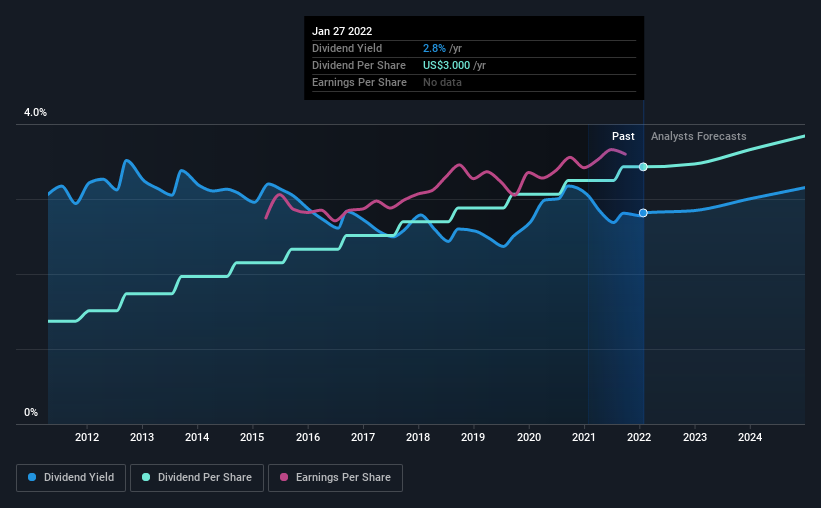Don't Buy IDACORP, Inc. (NYSE:IDA) For Its Next Dividend Without Doing These Checks
It looks like IDACORP, Inc. (NYSE:IDA) is about to go ex-dividend in the next four days. The ex-dividend date occurs one day before the record date which is the day on which shareholders need to be on the company's books in order to receive a dividend. The ex-dividend date is important because any transaction on a stock needs to have been settled before the record date in order to be eligible for a dividend. In other words, investors can purchase IDACORP's shares before the 2nd of February in order to be eligible for the dividend, which will be paid on the 28th of February.
The company's next dividend payment will be US$0.75 per share. Last year, in total, the company distributed US$3.00 to shareholders. Based on the last year's worth of payments, IDACORP stock has a trailing yield of around 2.8% on the current share price of $106.6. We love seeing companies pay a dividend, but it's also important to be sure that laying the golden eggs isn't going to kill our golden goose! So we need to check whether the dividend payments are covered, and if earnings are growing.
See our latest analysis for IDACORP
Dividends are usually paid out of company profits, so if a company pays out more than it earned then its dividend is usually at greater risk of being cut. IDACORP paid out more than half (57%) of its earnings last year, which is a regular payout ratio for most companies. A useful secondary check can be to evaluate whether IDACORP generated enough free cash flow to afford its dividend. Over the past year it paid out 148% of its free cash flow as dividends, which is uncomfortably high. We're curious about why the company paid out more cash than it generated last year, since this can be one of the early signs that a dividend may be unsustainable.
While IDACORP's dividends were covered by the company's reported profits, cash is somewhat more important, so it's not great to see that the company didn't generate enough cash to pay its dividend. Cash is king, as they say, and were IDACORP to repeatedly pay dividends that aren't well covered by cashflow, we would consider this a warning sign.
Click here to see the company's payout ratio, plus analyst estimates of its future dividends.
Have Earnings And Dividends Been Growing?
Stocks in companies that generate sustainable earnings growth often make the best dividend prospects, as it is easier to lift the dividend when earnings are rising. If business enters a downturn and the dividend is cut, the company could see its value fall precipitously. This is why it's a relief to see IDACORP earnings per share are up 5.0% per annum over the last five years. Earnings have been growing at a steady rate, but we're concerned dividend payments consumed most of the company's cash flow over the past year.
Many investors will assess a company's dividend performance by evaluating how much the dividend payments have changed over time. In the last 10 years, IDACORP has lifted its dividend by approximately 9.6% a year on average. We're glad to see dividends rising alongside earnings over a number of years, which may be a sign the company intends to share the growth with shareholders.
Final Takeaway
From a dividend perspective, should investors buy or avoid IDACORP? IDACORP is paying out a reasonable percentage of its income and an uncomfortably high 148% of its cash flow as dividends. At least earnings per share have been growing steadily. It's not that we think IDACORP is a bad company, but these characteristics don't generally lead to outstanding dividend performance.
Having said that, if you're looking at this stock without much concern for the dividend, you should still be familiar of the risks involved with IDACORP. Case in point: We've spotted 1 warning sign for IDACORP you should be aware of.
A common investment mistake is buying the first interesting stock you see. Here you can find a list of promising dividend stocks with a greater than 2% yield and an upcoming dividend.
Have feedback on this article? Concerned about the content? Get in touch with us directly. Alternatively, email editorial-team (at) simplywallst.com.
This article by Simply Wall St is general in nature. We provide commentary based on historical data and analyst forecasts only using an unbiased methodology and our articles are not intended to be financial advice. It does not constitute a recommendation to buy or sell any stock, and does not take account of your objectives, or your financial situation. We aim to bring you long-term focused analysis driven by fundamental data. Note that our analysis may not factor in the latest price-sensitive company announcements or qualitative material. Simply Wall St has no position in any stocks mentioned.


